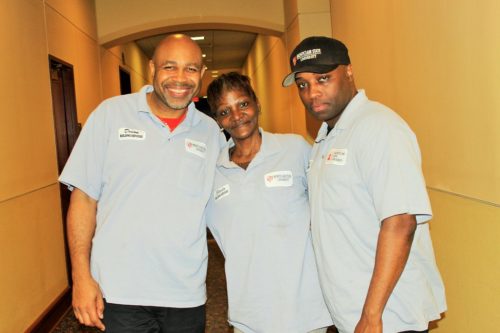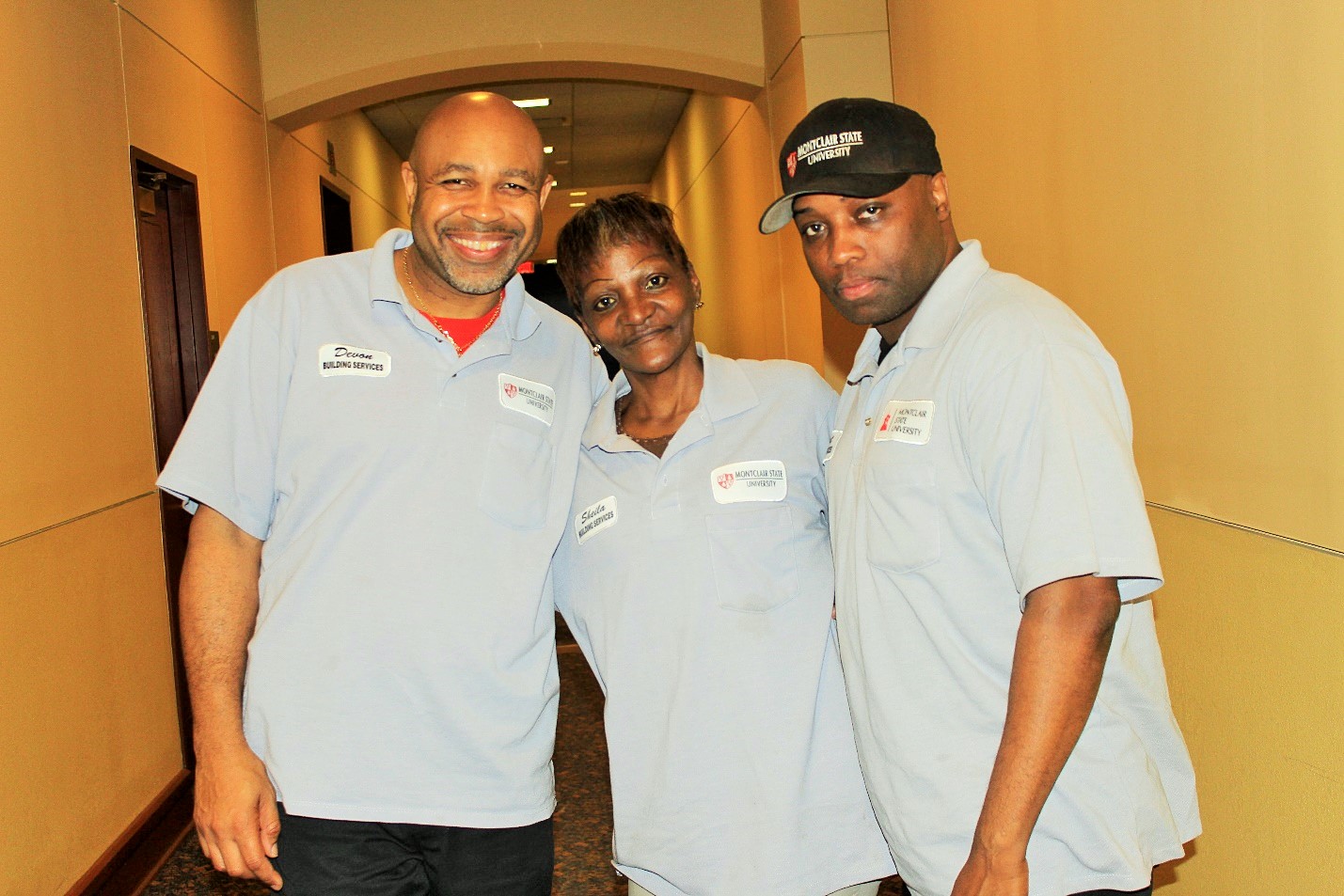“‘Building services,” “housekeepers,” “custodians”— these are just some of the terms used to describe those whose job it is to keep the bathrooms and classrooms at Montclair State University clean.
It is almost half an hour past noon and Devon Hayden is the first custodian to arrive at University Hall for the 12:30 until 9 p.m. shift — the shift he’s worked five days a week for almost two years now.
He walks down the narrow hallway with a broad smile on his face as he approaches me.
“How was your weekend?” he asked as he stopped at the door to the small room that I stood in front of for less than a minute, as I waited for someone to respond to my gentle knocks.
When we finally gained access into the room reserved for “housekeeping,” we sat down, and I reminded Hayden of my purpose for occupying his break room for the second time in less than a week.
“It’s a job,” said Hayden when asked what it’s like to be a janitor at Montclair State. “Some days are messier than others, but it’s a non-stop atmosphere. There’s always something that has to be done.”
Hayden, who was born in Jamaica but currently lives in Passaic, New Jersey, told me that, although he’s held a position as a janitor for a long time now, the students at Montclair State are what keeps him here.
“If it wasn’t for the students, I wouldn’t have a job,” said Hayden.
Just as I begin taking out my cell phone to record the remainder of the interview, two more workers come in for their shift, and I am greeted with a warm welcome.
“Oh no,” voices cried from behind me. “It’s today?” I hear someone ask, along with laughter and questions: “What I’m supposed to say here?” and “What do you need me to say?”
The voices were those of Robert Webb and Sheila Webb, who also work the day shift and would later joke about being husband and wife when revealing the coincidence of the exact pronunciation and spelling of their last names. “We’re not married,” said Sheila as she laughs at my reaction to the prank that the two pull on everyone. “No, we’re just co-workers, but we have the same last name,” Robert adds.
Robert, of Newark, has been a housekeeper at Montclair State for 10 years now, and his co-worker Sheila, also of Newark, but who has recently moved to East Orange, has been at the university for 11 years.
“There’s more students,” said Sheila when asked of the significant changes she has observed over the years she’s spent here as a staff member of the Red Hawk community. “There’s more buildings going up, but not a lot of hiring [custodians] for the buildings,” she said.
Although Robert seemed resistant to speak to me at first, I soon learned that being “difficult” is just an act that he puts on for new faces. When I asked Robert to answer the same question I asked Hayden, he answered openly, repeating the question for himself: “What is it like to be a janitor?” he said, pondering the question. He then quickly responded, “I like it. It’s messy,” followed by a burst of laughter.
“The only thing I would say about this janitor job is I wish that the deans and the professors would at least tell the students to throw their garbage away when they’re eating inside the classrooms,” he said. “Help us out.”
“We just need the students to be more helpful when it comes to our job to make it a little easier,” said Sheila. “They probably thinking that [we] only got this one area [to clean], but that’s not true. We have the whole building and, when people don’t come in [to work], we really don’t have help. We love our job. Sometimes it’s just hard.”
Hayden, Robert and Sheila make up the “policing crew,” and, together, they are responsible for cleaning the bathrooms, emptying the garbage cans in the classrooms and offices and high-dusting and sweeping the hallways in University Hall. Sometimes, however, when there is a short staff of housekeepers, they are needed as “floaters,” or custodians that rotate from building to building, often cleaning up to three buildings during their eight-hour shift.
On the day of the interview, however, they remained in University Hall. After a brief visit from their supervisor, Josephine Coppolla, the policing crew would begin preparing their carts with the cleaning supplies that they would need for their daily rounds: toilet paper, paper towels, sanitary napkins, toilet seat covers, hand soap and garbage bags — the main thing is garbage bags, I am told.
Before organizing her cart, Sheila filled a yellow mop bucket with water that she got from grey hoses that rested inside what appeared to be a miniature bathtub — long enough to fit about 80 sponges.
Once her cart was ready, Sheila started with the women’s bathroom on the first floor of University Hall. “I check the toilets for urine, check the mirrors, the sanitizers, refill the paper towels,” Sheila said as she sprayed chemicals on all of the toilet seats in the bathroom stalls. “All the chemicals we use here are Earth Green,” she said, adding that using products like bleach could upset a person’s allergies.
After spraying chemicals on all of the toilet seats, Sheila prepares to clean the mirrors while simultaneously buying time for the chemicals to take effect on the toilet seats. She starts spraying the mirrors and then ripped a couple of paper towels from off the roll.
Once she starts wiping the mirror to and fro with her paper towel, it takes a while for her to break away, as she is determined to make them look perfect. She bends her knees slightly, allowing her to lean in closer to the mirror, focuses more closely on the dust and dirt — and then wipes again. “I like to keep the mirrors clean,” she tells me. “They just look so nasty when they’re all dirty.”
She returns to the toilet seats, and just as she finishes wiping the toilet in the first stall, a woman who appeared to be a student came in and once she realized that the stall that she was about to occupy had just been cleaned, said thank you to Sheila.
“By the time I come out of here and come back, you’d be like ‘girl didn’t you jest clean this?’” Sheila said, laughing while going to the next stall.
When she comes out, she is out of breath, but manages to tell me that a lot of the students at Montclair State are appreciative of the housekeepers. “Every year, the students throw us a Thanksgiving party,” said Sheila. “We really love it. They’re sweeties, and they’re what keeps us going.”
After she mops the bathroom floor, she heads over to the men’s bathroom, deciding that she would refill the paper towels in the women’s bathroom during her next round. Sheila is responsible for cleaning each bathroom on the first floor at least three times a day.
While at first I waited outside the men’s room for Sheila to finish cleaning, she insisted that it was okay for me to come inside to observe. When she’s in the men’s bathroom, male students, faculty and staff are not allowed to come in, and the same goes for male janitors and female occupants.
“But the men try to come in anyway,” Sheila said, describing how men are at first indifferent to woman housekeepers cleaning their bathroom while they utilize it — that is until Sheila asks, “Would you want your mother to see you using the bathroom?” which leaves the men stumped, forcing them to turn around and let Sheila finish her job.




